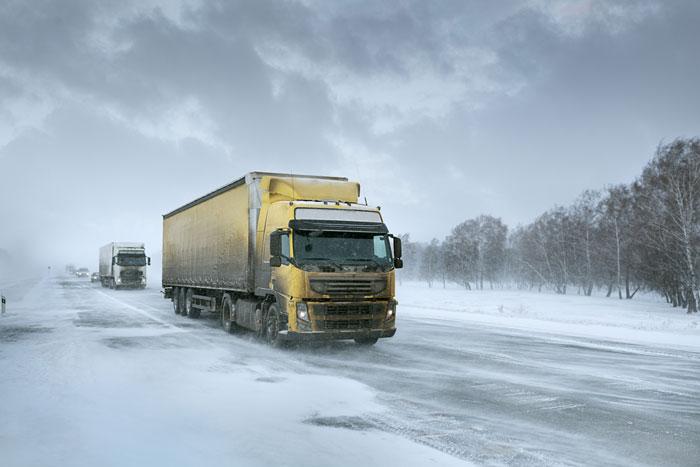5 Safety Tips for Commercial Drivers Driving in the Winter
Being a commercial driver is a rewarding career with many opportunities for advancement and good side benefits like getting to see many parts of the country. However, this career isn’t without its challenges.
In fact, even the most experienced drivers who have been handling commercial vehicles for decades can have trouble on icy roads when temperatures dip to negative degrees. Combining this with poor visibility and reduced traction or winter driving can create a perfect storm as it were for even the most experienced commercial driver, causing an extremely challenging situation.
Thankfully, planning ahead and knowing these winter driving tips for truck drivers, commercial drivers, or fleet owners can increase their ability to positively handle weather conditions. 
1. Start Prepared
The first step in handling hazardous road conditions or winter weather, in general, is knowing it’s coming, and being prepared. Consider the following factors to ensure that you are ready for anything this winter might throw at you on the roadway:
Ensure you have the right equipment for your journey before even starting your commercial vehicle. This is especially important during winter months when winter driving conditions can change in a matter of hours or even minutes.
Have safety supplies ready to deal with low temperatures. For example, make sure you have extra layers on hand and food to sustain you if you are unable to continue traveling. A good list of supplies to make sure you have on hand is as follows:
Water: The human body can only survive for three days without water. So make sure that you have a supply that provides you with about 15.5 cups of water daily.
Ice scraper: This is obviously to clear your vision through your windows or windshield when frost or ice makes visibility bad.
Shovel: Use this tool to dig your rig out of a mess.
Jumper cables: This is important if your battery dies.
Extra gas: If you are stuck and unable to move, yet need to run your rig to stay warm, you will likely need extra gas.
Chargers: This will ensure that you have your phone in working order, which can be important to getting you help.
Tire chains: These will give your tires extra grip and hopefully get you back on the road.
Emergency supplies: Any emergency kit should include pain relievers, first aid-type products like band-aids, and disinfectants. Even during regular weather having such a kit on board is handy.
Flashlight: When you find yourself stuck on the roadway at night, you will be glad for some light to illuminate your surroundings.
Batteries: You of course need extra batteries for all the things like flashlights that you will use to keep yourself safe while either waiting out a storm or waiting for help to get to you.
2. Look At Your Truck
It’s always a good idea to make sure that your truck or your fleet is ready for the roadway, especially before beginning a journey in the heart of winter. Inspect your truck and look at all the following items before leaving on any road trip:
Tires: Make sure they are in good working condition and have good traction.
Battery: This will keep you up and moving, so make sure your battery is in good repair.
Wiper blades: You will need your wiper blades to work efficiently to ensure that your vision remains clear.
Fluid levels: Make sure all your fluid levels are at normal levels.
Lights: Ensure that your lights are working correctly and giving you as much illumination as possible.
Exhaust pipe: Make sure your exhaust pipe is free of debris and not clogged up.
Defrosters: Make sure all your defrosters are working correctly as you might need them to clear your vision.
Heat: Obviously, you want to make sure that your heat is working well when driving in winter conditions.
Air compression: Make sure all the air compression units on the fleet are working.
CB radio: Ensure you have a working CB radio if you have to use this method to communicate with the base or other drivers.
3. Be Aware of Weather Conditions
Before heading out, make sure you know the expected weather conditions or the local forecasts for areas you will be traveling through. You also need to find out if any routes that are your trip are close. To get this information, use your GPS systems, and your radio, and also call base frequently to check in if weather conditions are changing rapidly.
4. Slow Down
While it can be tempting to just hurry through inclement weather trying to get back into good weather, don’t make the mistake of speeding when conditions are bad. Going faster won’t actually get you anywhere faster and won’t get you there faster in bad weather. Instead, it will put you at risk of hurting yourself and others. After all, when the roads get slick, there’s less traction, which makes it harder to stop and/or turn. Therefore, it’s important when dealing with winter conditions to slow down and reduce your speed as conditions worsen to stay safe. It’s also important to accelerate slowly to keep yourself from sliding. Avoid using cruise control as well when conditions are not ideal on the roadway.
5. When in Doubt, Pull Over
It’s understandable that you want to get where you are going and not delay any more than necessary. However, in some cases, delaying or stopping altogether might be the only course of action that will keep you safe. This is especially true if you are trying to navigate a truck on roadways that haven’t been treated or plowed yet after snow. If this is the situation you find yourself in, it’s safer to just pull over and wait out the storm. If you find yourself having to do this, you can call ahead and let applicable parties know that you are experiencing a delay and need to alter your delivery time. It is always a better idea to delay and avoid a crash or worse.
Be Your Own Advocate
Even with the experience of a brand behind you, when you are out on the roadway in charge of a big rig or other commercial fleet vehicles, you have to prepare yourself for what might happen. In the winter, poor road conditions, lack of visibility, decreased stability, traction, and overall performance can make experiencing an accident more likely. Therefore, in order to avoid these scenarios, and keep yourself and your commercial vehicle safe on the road this winter, you need to make sure you and all those who drive for you are well-equipped to handle winter driving conditions. 



